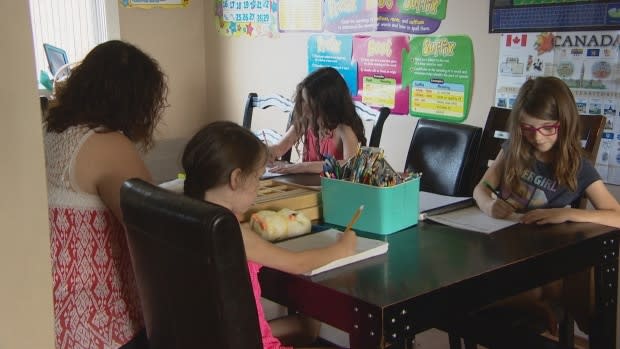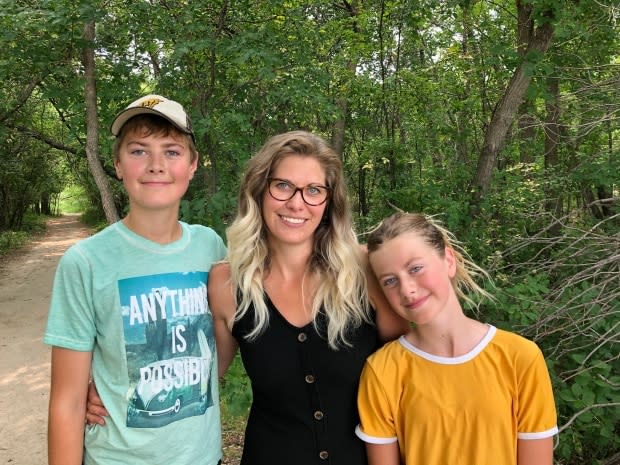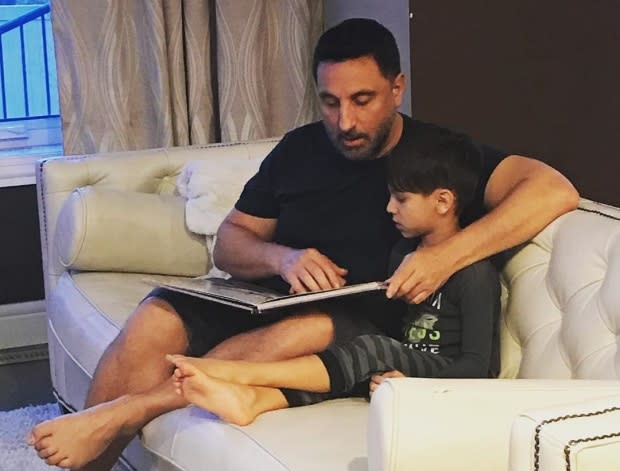As parents scramble for options this fall, some are leaving conventional school out of the equation

Six years ago, when, as a young mom, Twyla McDougall started thinking about home-schooling her children, she wasn't sure she could pull it off.
McDougall, a former dental hygienist, thought parents who taught their own children at home had to be "ridiculously smart," extremely organized, financially well-off, and familiar with school curriculums.
"That's so not true, and I'm so thankful for that," she said with a laugh.
With so many parents feeling anxiety about sending their kids into the classroom, home-based education, known as home-schooling, is getting more attention. It requires more from parents than just supervising virtual learning. In home-schooling, parents become the teachers and must find or create lesson plans and, if required, do their own evaluations and record-keeping.
Some would-be home-schoolers have posted in online forums that they believe teaching their own kids would be much less stressful than trying to cajole their child into sitting in front of a computer for virtual learning, an experience that got a failing grade from many parents in the spring.
Home-schooling is more time-intensive and more responsibility than sending kids to class, but also means more control and flexibility, said McDougall, who lives in Regina.
She felt compelled to give it a shot after her daughter, Ella, now 10, was diagnosed with cystic fibrosis, a chronic lung condition. McDougall didn't want Ella, who is often hospitalized, to be unnecessarily exposed to germs in the "Petri dish" of elementary school.

Six years later, McDougall home-schools all three of her daughters — Ella, 10, Soleil, 8, and Allegra, 7 — and loves it.
She's been getting a lot of questions from parents who are considering home-schooling this fall.
"I don't think it's as hard as people think," she said.
That doesn't mean it's easy, though.
Provincial requirements vary
Many parents, particularly low-income families and essential workers, say they have no choice but to send their kids back to the classroom. Some others working full-time jobs from home say that supervising their child's remote learning is difficult to manage.
Monique Willms, a former public school teacher who home-schools her two children in Estevan, Sask., started a Facebook page called Suddenly Homeschooling and a mentoring service for parents considering it.
"The flood of questions has been constant," she said. "I could spend easily eight hours a day just answering questions."
WATCH | Monique Willms offers advice on home-schooling:
Only a tiny fraction of Canadian students — less than one per cent — are home-schooled, according to a 2017 report by the Fraser Institute, a conservative think-tank. The requirements and funding vary in different provinces.
Some provinces, such as Saskatchewan, New Brunswick and Quebec, require home-schooling parents to submit a written education plan that details areas of study, learning outcomes, and their plans for assessment. Others, such as Ontario and P.E.I, only ask for notification from parents that they're home-schooling.
Some provinces provide free access to instructional materials and textbooks, and all the territories reimburse expenses. Only Alberta and Saskatchewan offer funding to parents who register before a certain deadline.
Across Canada, there is no mandatory testing of home-schooled children, though Quebec has plans to introduce mandatory exams in the coming years. Both Alberta and Quebec have a monitoring system in place to check on home-schooled children, but most provinces do not.
James Dwyer, a law professor from Virginia who co-authored the book Homeschooling: The History and Philosophy of a Controversial Practice, finds the lack of oversight to be alarming.
"There are some home-schools where the only effort that's made is to just indoctrinate religiously," he said.
'A thousand wonderful ways to do it'
Both McDougall and Willms believe that motivated parents who can juggle their work schedules or make a financial sacrifice are capable and qualified to teach their children.
"There are honestly a thousand wonderful ways to do it," said Willms, who also runs her own business from home and frequently works as a substitute teacher in local public schools.
She said parents shouldn't worry that they won't be patient enough or won't remember how to do math equations and science experiments.
"I say, 'I don't know' to my children daily about a dozen times," she said. "It's followed up with, 'Yeah, I wonder … let's go look it up.'"
For example, Willms doesn't teach subjects separately but rather incorporates math, science, English and art into a walk in the woods. Her children are interested in ancient civilizations so this fall, they will brainstorm to come up with their own imaginary civilization and create a history, religion and maps of resources for it.

For children in traditional school, the average school day is usually about six and a half hours. McDougall spends a lot less time than that formally instructing her children each day. She sets them up at the kitchen table every morning at 9 a.m. for more structured learning but then keeps their afternoons free for play, social gatherings, field trips and other activities.
Home-schoolers often work together as a co-operative or meet up in groups for field trips, although that will present some challenges this fall with COVID-19 restrictions on the size of social gatherings.
The academic success of home-schooled children is a topic of much debate and conflicting research. A 2015 report on home-schooling in Canada from the Fraser Institute found studies generally show higher academic percentile scores for home-schooled students when tested by researchers. The report indicated, however, that many studies only test gifted children or don't account for other factors.
McDougall said home-schooling offers more flexibility for children to learn at their own pace.
"We don't have to force something," she said. "It doesn't mean that we shouldn't push through and try, but if this is just not coming together for that child right then, well, let's focus on something else until that child is ready to take that on again.
"That seems to really work well."
Not a viable option for some parents
Alec Couros, a professor of educational technology at the University of Regina and former high school teacher, is still trying to decide what learning option to choose for his four children.
His first choice is face-to-face instruction in the classroom — if he's satisfied with safety protocols. But he may still opt for remote learning, which requires him to play a mentor role.

Couros says home-schooling would be too demanding.
"It's very time intensive," he said.
He has four children ranging in age from six to 16 and a full-time job teaching online university classes from home.
"Although I'm trained as a teacher, I don't intimately know the curriculum for each level," he said. "I'd really like to trust a teacher to do the assessment to ensure the curriculum objectives are covered," he said.
The clock is ticking, and stress levels are high for parents who haven't decided what to do with their children's education this fall. But both McDougall and Willms feel much differently.
"I'm excited, and we have planning underway," said Willms. "We just have a lot of peace."
WATCH | McDougall explains what it takes to home-school:


